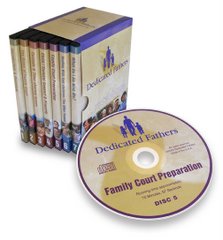Parental Alienation (part 1)
www.dedicatedfathers.org
BY: Marvin L. Chapman
Within the mental health field there continues to be an ongoing debate as to whether or not there is such a thing as parental alienation. Some research appears to support the notions behind parental alienation and its effects on children, and yet other research appears to refute it. However, for those of us in the trenches - especially those of us who have spent years in the family court arena - there is no doubt about parental alienation and its consequences.
Parental alienation is generally defined as one parent repeatedly and continuously programming or brainwashing their child against the other parent. Parental alienation may include such acts as obstructing, interfering or outright denying the child’s right to spend time with the other parent. It usually includes statements that the other parent does not care about the child, is too busy for the child, or similar statements all used to coerce the child into believing the other parent and even their extended family do not love the children or care about them anymore. Such begins the breaking down of the parent-child relationship. In its worst form, parental alienation involves false allegations of abuse, neglect, or some other form of alleged harm to the child.
Of the research I have read, most of those opposing the notion of parental alienation have a clear bias towards mothers. This is not surprising given the fact the mother is almost always the parent who attempts to alienate the children, very seldom the father. Those who oppose the notion of parental alienation overwhelmingly state that if there is any real alienation, then it comes from the fathers’ own actions and not due to any wrongdoing on the part of the mother. It appears to me that those who buy into the notion only mother’s can nurture and care for children also buy into the notion that mother’s would never purposefully and systematically alienate the children against their father.
In over 26 years within the family courts, I can categorically state parental alienation is very real in family law. Anyone spending half a day in any family court will clearly see the systematic alienation that is perpetrated in many cases (but then going to court and finding out what really goes on is NOT scientific study - it’s REALITY). Some form of parental alienation is in about fifty percent (50%) of all of my cases as indicated by the following:
The number 1 complaint of all fathers I have seen in over 25 years is that the mother is causing interference, obstruction and denial of their children’s right to spend time with the father.
The number 2 complaint of all fathers I have seen in over 25 years is that the mother is repeatedly and continuously making degrading and derogatory remarks about the father either directly to the children, or at the very least within hearing distance of the children.
The number 3 complaint of all fathers I have seen in over 25 years is that the mother prevents or severely limits the father from having any significant say in the lives of their children as to health decisions, educational decisions, extra-curricular activities and other general welfare decisions - actions which are made solely and unilaterally by the mother.
As stated above, I have found some form of parental alienation in about fifty percent (50%) of all of my cases for over 26 years as outlined above. Therefore, for me and my clients, parental alienation is extremely common. No only are these acts alienating the children, I support the notion that such acts rise to the level of child abuse. It is abusive for one parent to interfere, obstruct or denial children their right to spend time with the other parent. It is abusive for one parent to continuously make degrading and derogatory remarks about the other parent, whether directly to the children or within hearing distance of the children. And it is abusive for one parent to make sole unilateral decisions about the children without any significant input from the other parent - basically cutting the other parent out of the decisions making process for their children.
Unfortunately, what I call child abuse, family court judges call “primary physical custody to mother.” I see hundreds of clients each year and in over half of those cases I hear at least one (1) of the complaints outlined above. Extrapolate those numbers to the general population and we can only guess at the real number of children being abused through the alienation action of their mother.
The reasons one parent alienates the children against the other parent are as varied as the parents’ themselves. However, there are some attributes which have been identified as being the driving force behind alienating behavior, which are the following:
1. Alienating parents may have feelings of abandonment, anger and rage at the other parent;
2. Alienating parents many times are seeking revenge for perceived wrongs;
3. Alienating parents may have acute or chronic psychological and/or emotional problems;
4. Alienating parents typically harbor resentment from events that happened during the marriage;
5. Alienating parents can be over-enmeshed with their children, resulting in over-protectiveness; and
6. Alienating parents may have an overwhelming need to “prove” they were right and the other parent was wrong.
Likewise, some children are more susceptible to alienation than others and there are some attributes which have been found to be common among children who succumb to alienation tactics, which are the following:
1. Children with a strong psychological bond with the alienating parent;
2. Children with an excessively dependent relationship with the alienating parent;
3. Children who live in fear of losing the alienating parent’s love and support;
4. Children who become overly protective of the alienating parent - sometimes taking on the role of a surrogate spouse (taking “care of” the alienating parent); and
5. Children who respond positively to outside encouragement for expressing their feelings of being abandonment or rejection by the alienated parent.
Please check back next week for part 2 of this article on Parental Alienation.
Be sure to visit our website for more information on divorce and child custody.
www.dedicatedfathers.org
Wednesday, June 27, 2007
Parental Alienation (Part 1)
Posted by
Dedicated Father
at
7:19 PM
189
comments
![]()
Labels: child abuse, child custody, child support, children, divorce, divorce coach, divorce mediation, family court, fathers rights, kids, parental alienation, parenting rights, paternity
Friday, May 18, 2007
Family Court: Preparing for your Divorce Case
Preparing Your Divorce Case
www.dedicatedfathers.org
Step 1: KEEPING A JOURNAL
Immediately upon knowing you will be going into family court (or when you think you are heading into family court), one of the first and most important things you need to start doing is keeping journal of all significant events concerning you, your children, your finances and the other parent.
More often than not, each time you go to your divorce or child custody hearings you will need to provide a statement as to specifically what you want and justification for why you should get it. This written statement is called your “declaration.” The information in your declaration is taken directly from your written journal as outlined above.
In family court, some judges will not listen to what you have to say verbally. They will rely totally on what you have written in your papers and what the other parent has written in their responsive papers. Therefore, writing your declaration may be a very critical part of whether or not you get what you are asking for, which makes your journal entries extremely important to your case.
Step 2: PREPARING TO WRITE YOUR DECLARATION
Stay away from bringing up negative issues about the other parent, it usually makes you and not the other parent, look bad in the eyes of the court. However, many times in response to issues raised by the other parent, you will need to respond by bring up negative issues. Likewise, many times the only way to show a substantial change of circumstances affecting the best interest of your child is to bring up negative issues about the other parent. However, be very careful in the way you bring up those negative issues.
Only bring up negative issues IF you can show, demonstrate or prove how it directly affects your child or your relationship with your child - otherwise, leave it alone.
The cardinal rule of bringing up negative issues is that you always, always, always, label the negative issues as “CONCERNS.” Example: “I am concerned that every time I go to pick up our child, the other parent is never at home. I believe this confuses our child and allows our child to believe I have not come to see them and do not care about them, which is simply not true and not in our child’s best interests.”
Step 3: WRITING YOUR DECLARATION
Your declaration is simply your very clearly written statement of what has happened, including all dates whenever possible, which clearly provide the court with the reasons and justifications for the order you want the court to make. Every request you make needs to have a reason or justification for it. The judge knows absolutely nothing about you or your case. You need to bring the judge up to speed about your case very quickly (they don’t have much time to review each case, maybe 5 to 10 minutes at most).
Whenever possible, attach proof or evidence which supports what you are writing. If you do not have the proof or evidence, then state where such evidence is located. Some ideas as to proof or evidence may be pictures of you and your children enjoying your time together, statements from witnesses who have seen you interact with your children, time cards showing when you actually work, letters from teachers or church leaders as to your involvement with school and church. Get creative, but be able to back up your claims.
Step 4: THE COURT FILE
You will want to ensure you have an exact copy of the court divorce file, which you can get from the County Clerk at your family courthouse. Your court divorce file is needed so whomever is assisting you can see what has happened so far in your case.
Also, there are many times wherein something which has happened before will prevent you from bringing up the same issues again - a review of your court file will let you know this information. Additionally, there are many times wherein new or different paperwork is required based on what has happened before - again, a review of your court file will let you know this information.
Therefore, you will want to keep and maintain an up-to-date court file at all times.
Step 5: CHILD SUPPORT AND SPOUSAL SUPPORT (ALIMONY)
It is in your best interests to start getting copies of all canceled checks made for any kind of support you have paid and ensure you make copies of both the front and the back of those checks. Additionally, ensure you put on the check itself on the bottom left hand “comments” section that the check is for “child support” or “spousal support.”
IF YOU CAN’T PROVE YOU HAVE PAID IT, YOU OWE IT !
Never, ever pay any type of support in cash. Why? Because there is no way to prove the other parent received the money if you do not have a copy of the other parent’s signature and deposit notations from your canceled check.
Step 6: MAINTAIN ORGANIZED FILES OF EVERYTHING
You will eventually have numerous files about your divorce or child custody case which you will want to maintain and keep organized at all times. Some of the files you will want to keep are as follows:
A) One file for all correspondence with the other parent kept in chronological
order;
B) One file for all correspondence with your attorney and/or paralegal kept in
chronological order;
C) One file for all correspondence with the other parent’s family law attorney kept in chronological order;
D) One file for all correspondence with the state agency collecting support
payments kept in chronological order; and
E) One file of all proof of all payments made for support (including both the front and the back of canceled checks).
Step 7: CONSULTATION WITH AN ATTORNEY AND/OR PARALEGAL
Armed with all of the information as outlined in Step 1 through Step 6 above, you are now ready to consult with a family law attorney, paralegal and or support organization about your divorce or child custody case.
One last thing:
"Not everything that is faced can be changed, but nothing can be changed until
it is faced." ---James Baldwin
By: Marvin Chapman
Order the Dedicated Fathers Audio Series Today!
Posted by
Dedicated Father
at
1:25 PM
87
comments
![]()
Labels: child abuse, child custody, child support, court case, dads, dedicated fathers, divorce, divorce coach, divorce mediation, family court, family court system, fathers rights, law
Monday, March 5, 2007
Divorce Coach - Divorce coaching vs. Individual therapy
COLLABORATIVE DIVORCE COACHING
vs
INDIVIDUAL THERAPY
Marvin L. Chapman, MFT, CFC
Licensed Marriage and Family Therapist, MFC27081
Clinical Forensic Counselor, F16841
Certified Collaborative Divorce Coach
marvin@unitedfathers.org
www.unitedfathers.org
www.dedicatedfathers.org
Many people wonder what the difference is between a mental health professional
providing divorce coaching and a mental health professional providing
individual therapy.
Simply put: The major difference between divorce coaching and individual therapy
is the client, not the coaching or the therapeutic process.
Traditionally, individual therapy involves the assumption that the client is coming into therapy due to some real or perceived “problem” which they want to understand,
discover or have “treatment” thereon because their coping skills and/or current
manner of dealing with their “problem” is not working for them. Due to this
traditional thinking, it has long been a given that if someone is in therapy, something is “wrong” with them. Insurance companies and managed care facilities have
traditionally indicated a more comfortable position in dealing with emotional
“problems” from the medical model.
Simplified, the medical model says there is a disease (the problem), the symptoms
must be documented (a diagnoses from the DSM, yet another medical model),and a plan is laid out as to how the client will be “healed” (from the clinician’s
therapeutic orientation, paradigm or model). Based on this medical model, the
therapist will focus on the client’s history to assist in determining how the
“disease” (the problem) came about.
Many times you will hear therapists talk about the “pathology” of a client.
Ever wonder what “pathology” really means? (Definition: “The science or
Doctrine of diseases. That part of medicine which explains the nature of diseases,
their causes and their symptoms.” As you can see from the definition,
even in their diction, therapists use the medical model.)
With an understanding of the “pathology” the therapist can allegedly determine the
cause of the problem (the diagnosis). The therapist then gives the client new ways of
thinking, coping or behaving that allegedly will work better for them in the future
(the healing or curing of the problem). Under this simplified model, the therapist is the empowered helping agent; the client is the one with the “problem.”
Divorce coaching is different from individual therapy. In coaching, the client is not perceived as having any particular “problem” and the divorce coach does not
assume any “pathology.” Problems and/or pathological issues are only
dealt with if they impede the divorce process, wherein a suggestion may be
given that the client might benefit from therapy with an outside independent therapist.
In coaching, the therapist joins with the client in a duet of cooperation. The coach, having a therapeutic and mediation background, educates, offers insights and
observations, gives possibilities, and, at times, may even propose certain strategies
for the client to consider.
The divorce coach is specifically trained in the collaborative process to work closely with the client in their development of skills needed to deal with critical issues involving the divorce. Although coaching may be very therapeutic, it is not therapy.
The divorce process, whether adversarial or collaborative, is a complex and deeply
emotional process. Grief issues, such as denial, anger, bargaining and depression are usually involved, as well as a sense of loss and, many times, confusion.
Post relationship co-parenting issues are always a difficult area, as are support
and property issues. Individual parenting styles is also an area of concern for
many parents (How do I answer my kids’ questions? How do I or should I discipline
the kids who are already hurting?). Divorce coaches in the collaborative model
not only have specialized training of the collaborative process, they are also
generally very experienced in working with restructuring families.
As indicated above, the major difference between divorce coaching and
individual therapy is the client (not the coaching or therapeutic process).
In therapy, the client is perceived as having a “problem” with a particular
“pathology” for which the client is seeking help. In divorce coaching,
the client is not perceived as having any particular “problem”, and the
divorce coach does not assume any “pathology.” The divorce coach uses
their training and experience to assist their client through the collaborative divorce process in such a way that the client is able to move on with their life with the learned skills and knowledge needed to make their post divorce life as full and complete as possible.
BY: Marvin L. Chapman
www.unitedfathers.org
www.dedicatedfathers.org
Put Marvin's experience to work for you!
Order Dedicated Fathers Today!
Posted by
Dedicated Father
at
7:12 PM
32
comments
![]()
Labels: child custody, child support, collaborative divorce, court case, dads, divorce, divorce coach, divorce mediation, divorced dads, family court, fathers rights, law, legal, mediation
Tuesday, February 27, 2007
Mr. Marvin L. Chapman - Dedicated Fathers

Mr. Marvin L. Chapman
Author/Creator of Dedicated Fathers
President of United Fathers of America
Licensed Marriage and Family Therapist (MFC27081)
Clinical Forensic Couselor (F16841)
Certified Collaborative Divorce Coach
www.unitedfathers.org
www.dedicatedfathers.org
Mr. Marvin L. Chapman has over 25 years of experience both inside and outside of the family court system. He has been involved in thousands of cases and has developed a working professional relationship with the courts, facilitator's offices, Legal Aid Society, Department of Social Services, Department of Child Support Services, private attorneys, forensic professionals, private therapists, and many others. This lifetime of knowledge and experience is what Marvin draws upon when assisting parents who are going through the family court process. It is Marvin's passion and his joy to share his knowledge and experience with others.
Marvin Chapman's full professional resume and biography can be viewed by clicking on the following link:
Marvin's Bio
www.dedicatedfathers.org
Posted by
Dedicated Father
at
2:34 PM
3
comments
![]()
Labels: child custody, child support, divorce, divorce coach, divorce mediation, family court system, fathers rights, legal, mediation, survive divorce
Monday, February 26, 2007
divorce mediation part 5 - recommendation
DIVORCE MEDIATION
Part 5
Recommendation Mediation
BY: Marvin Chapman & Dedicated Fathers
www.dedicatedfathers.org
www.unitedfathers.org
Court Connected Mandatory Mediation - Recommendation Mediation
If your County Mediation office IS NOT confidential, meaning they do make a recommendation to the court, then listen closely...
Be very careful. Everything you say, every thing you do (or do not do), every action, every reaction, every statement or lack of statement, can and will be used against you by the mediator in their recommendation to the court.
Why? Because mediators are people with similar biases, prejudices, preconceived notions, belief in stereotypes and other dysfunctions - just like normal people. It is extremely unfortunate confidentiality is not mandated because in recommendation mediation, any and all of any particular mediators’ biases, prejudices, stereotypes and preconceived notions will have an effect on their “recommendation” to the court - a recommendation which the court will almost always follow.
If mediation is not confidential then you will need to dress, walk, talk and act as if you are in front of the judge. You will want to present your reasons and explanations for what you are asking without making disparaging remarks about the other parent and without the need to justify your reasons. This is a time to show how you can stay out of the garbage pit of emotions, time to show you can stay focused on the best interests of your children, and time to demonstrate how you plan on making your parenting plan work for all concerned.
Remember, if mediation is not confidential, then everything - and I mean everything -can be and will be subjectively evaluated by the mediator. The mediator’s subjective evaluation, including all of their biases, prejudices, preconceived notions and stereotype beliefs, will impact their recommendation to the court.
This is the time and place to demonstrate your friendliness, the openness from which you are willing to deal in mediation, and your pleasant personality in getting along with the other parent, all of which will go a long way towards warming the mediator to your way of thinking.
BY: Marvin Chapman
www.dedicatedfathers.org
Start defending your rights today with the Dedicated Fathers Audio Series!
Posted by
Dedicated Father
at
10:39 AM
11
comments
![]()
Labels: child custody, child support, court case, divorce, divorce mediation, family court, family court system, fathers rights, law, legal, mediation
Tuesday, January 30, 2007
A Thank You to all Dedicated Fathers

Thank You for Visiting Dedicated Fathers
www.dedicatedfathers.org
Thank you for being a Dedicated Father. You may not hear that from your children until years from now, you will probably never hear it from society; however, you will hear it repeatedly from us - thank you for being a Dedicated father.
By you visiting this blog, you or someone close to you is probably involved in a divorce, child custody , or family court battle. First and foremost let me assure you: YOU ARE NOT ALONE.
We have assisted thousands of fathers just like you who were confused and intimidated by the adversarial family court process. By empowering parents with information, they have been able to gain the confidence they needed to successfully confront their divorce or child custody case.
Obviously, there is no magic formula, each divorce or child custody case is unique unto itself.
However, there is one fact that is true in every case:
You need power when confronting the adversarial family court system.
You Need Power
Information is Power
You Need Information
Information allows you to make better and more informed decisions for you and your restructuring family. Information helps you remain sane - especially within the insane world of family court. Information will give you the tools to be an example to your children during this traumatic time.
Here are just five (5) examples of the information the Dedicated Fathers Audio Series will give you:
1. It will teach you how to take charge of your relationship with your children, which is the best way to let them know how much they mean to you.
2. It will help you to become pro-actively involved with your divorce case, rather than reactive.
3. It will empower you to confront the procedures of family court, and the inherent biases against fathers.
4. It will provide you with what you need to put yourself in a better position to successfully navigate the adversarial family court system.
5. It will show you how to gain control over your life by learning how to case manage and organize your own divorce or child custody case, thereby making you an actively involved team member with your attorney.
Family court IS NOT about going out and hiring the best family law attorney you can afford, and then just hoping and praying they will advocate for your interests and concerns.
Family court IS about becoming an active team member with your attorney.
Your family court mission statement is the following:
“My mission is to ensure my interests are protected and my concerns addressed in a pro-active and powerful manner. To accomplish my mission, I must be in a constant state of being prepared. I will have to live with the actions I take now, for the rest of my life. Therefore, I must get organized and I must stay organized for the betterment of myself and children.”
Learn from all the fathers who have gone before you. For over 26 years we have been assisting parents going through the trauma of divorce and the family courts. Take our experience and use it. The information in the Dedicated Fathers Audio Book Series will help demystify the confusing and frustrating adversarial family court process. It will help you can gain the confidence you need to confront the processes, procedures and divorce issues with which you will be bombarded throughout your stay in the adversarial family court arena.
Armed with the power of the information in the audio series, you will have with the power-tools needed to successfully complete your mission. For the cost of only one (1) hour with a family law attorney, you will receive the education and information which could save you thousands of dollars. Your future will thank you for your insight of taking the steps today which will bring you a better tomorrow.
Again, Thank you for being a Dedicated Father.
I look forward to your joining our growing family of Dedicated fathers and like them, remember....
YOU ARE NOT ALONE.
By: Marvin Chapman & Dedicated Fathers
www.dedicatedfathers.org
Get the ultimate tool to help you defend your rights!
Order Dedicated Fathers Today!
Posted by
Dedicated Father
at
4:03 PM
0
comments
![]()
Labels: child custody, child support, collaborative divorce, dads, divorce, divorce coach, divorce mediation, family court, family court system, fathers rights
Friday, December 29, 2006
To Hire an Attorney or not to Hire an Attorney (Part 2)
TO HIRE OR NOT TO HIRE AN ATTORNEY
Part Two of Two Parts
www.dedicatedfathers.org
For more related divorce information
It has been said that a person who represents themselves has a fool for a client. If this is true, is it also true that a person who hires an attorney has fool in charge of their life?
In other words, you’re damned if you do and damned if you don’t. Therefore, you need to know when, why and how to hire an attorney.
In California, if you appear in court and represent yourself it is called going In Pro Per, which literally means “In one’s own proper person.” Some states call representing yourself Pro Se, which literally means “For one’s own behalf, in person.” No matter what your state may call it, it means you are representing yourself in court. Many people have handled their own family court case, with just a little help in doing the required legal paperwork.
If it appears your case will be routine or normal (meaning no known or expected surprises), and if there does not appear to be a lot of areas of serious disagreement between you and the other side, and if you are comfortable speaking in front of people, then a paralegal or support group can help you save a lot of money by assisting you in representing yourself.
Question?
What kind of people represent themselves?
Answer:
Most people represent themselves because they outright cannot afford a family law attorney. Some people represent themselves because they have been represented by an attorneys in the past and they now believe they can represent their own interests as well, if not better, than their previous attorneys. And there are those who represent themselves because they feel that even if they lose, they will have won by not having to pay the high costs of a family law attorney (some people believe just the fact of not paying an attorney is a “win”).
Reality is that many cases require a family law attorney. An example of a divorce case requiring an attorney would be a case where there is a major confrontation over issues of custody and visitation and/or where there are serious differences over distribution of the community property. These kind of cases mandate an attorney and it would be prudent for you to retain the best attorney you can afford (of course there are those cases wherein you absolutely can not get the money together to hire an attorney. In those cases it is obviously better to represent yourself as best you can, rather than allow a default to be entered against you. In these situations, representing yourself will at least let you know for the rest of your life that you did all you could do).
However, whether or not you hire an attorney, it remains your responsibility to keep your case organized, to keep yourself updated on all happenings in your case, and to continually stay informed as to all facts
The following two sections are presented solely to assist you in determining whether or not you will want to attempt to represent yourself and, if you choose to involve an attorney, some guidelines to assist you in determining which attorney is best for you. You may want to check your state and local rules, regulations and procedures to discover whether the following notions are valid in your particular area.
If Hiring a family law attorney
1. One of the best ways to choose an attorney is to either get a recommendation from your local father’s rights organization or check with family, friends and co-workers. Hiring a family law attorney is just the opposite of hiring a criminal attorney. If hiring a criminal attorney, you want the best legal mind you can afford. Family law is just the opposite. Family law is almost totally subjective feelings and biases. In family law you are hiring a personality, someone you can get along with and who is passionate about your case and your goals.
2. Nothing is worse than a personality clash with the attorney you hired to protect you. This is your and your children’s future. During the initial consultation you will need to make a sound intelligent decision based heavily on whether or not you feel and believe you can work as a team member with the attorney. Remember, your attorney is in the driver’s seat and you need to feel very comfortable with them at the controls of your future. Therefore, when interviewing a family law attorney, you may want to consider some of the following Things to look for in an attorney... and What to avoid when hiring an attorney....
A. Things to look for in a family law attorney...
1) Is the attorney friendly, passionate and non-intimidating;
2) Will the attorney return your phone calls within a “reasonable” time;
3) Does the attorneys’ recommendations make common sense;
4) What does the attorney charge per hour and will the attorney bill you
monthly so you can easily see on a regular basis what the attorney is
costing you;
5) Are credit card payments accepted;
6) How strongly does the family law attorney support alternatives to traditional
litigation,such as outside mediation or collaborative divorce;
7) How much experience does the attorney have in family law;
8) Does the attorney specialize in family law. Just as you would not want a
general doctor to perform open-heart surgery on you, you do not want a
general attorney performing your family law case;
9) Make an agreement with your attorney in writing on your mutually agreeable
and attainable goals. To avoid misunderstandings always put both large and
small requests in writing and keep a copy for yourself (again, stay
organized);
10) Get in touch and stay in touch with a local support organization for
support, encouragement and to ensure your case is proceeding according to
your wishes; and
11) Ensure you will be given a copy of any and all documents filed on your
behalf or served on your attorney relevant to your case.
B. What to avoid when hiring a family law attorney...
1) No matter what, avoid a “divorce mill” type of operation where a group of
people are grinding out paperwork one after another and an attorney just
picks up the paperwork and goes to court. This is not an assembly line
operation, this is your life, your future and your future relationship with
your kids. This is serious business and you will want to treat it that way;
2) Avoid any and all attorneys who tell you their retainer is “non-refundable;”
3) Be suspicious and avoid any attorney who appears overly aggressive and any
attorney who “guarantees” you a certain order. Family law is an extremely
subjective area of law and no one can possibly guarantee anything;
4) Do not share an attorney with the other parent. If your case requires an
attorney, then get your own attorney to protect you and your children’s
legal rights;
5) Whatever it takes, avoid financial problems between you and your attorney.
If for any reason you are unable to honor your financial agreement with your
attorney, immediately request a meeting and work out a new agreement. You
need your attorney playing attorney, not banker;
6) Avoid letting your attorney talk you into giving up something which you
feel is important, just so the attorney can expedite the case. Be
realistic and reasonable, not foolish. Remember, you may have to live with
the results for a long time, a little extra time now can save you a lot of
heartache later. Read all legal papers you are asked to sign, understand
them clearly and completely before signing and always keep a copy for
yourself. If you find unclear language or something that is subject to any
kind of interpretation, ask your attorney to have it rewritten so it is
explicitly clear;
7) If your attorney states you do not need to be present at a hearing, make
sure you find out why you are not needed. If in doubt, have your attorney
put it in writing that you do not need attend and that he/she will make no
agreements without your consent. However, the general rule of thumb is that
you need to attend ALL court proceedings. This is you and your children’s
future and you need to be there, you need and must know what is going on in
your case;
8) After each meeting with your attorney (whether in person or over the phone)
write down what was said, accomplished, promised or planned. Mail a copy of
your written understanding of the meeting to your attorney to memorialize
that the meeting took place and what was accomplished. This will assist
your attorney in keeping on track and will remind the attorney of what was
promised;
9) Avoid telling the attorney how much money you have or how much you are
willing to spend on your case. The attorney’s focus should be about your
case, not how much money you have available to give him/her. If the
attorney talks too much about money - leave the office. An attorney
whose main focus is the money is only feeling you out to see
how much they can get from you up front - how much they can
get for a retainer;
10) Make copies of all important papers to give to your attorney. Avoid giving
originals to your attorney unless absolutely necessary. If absolutely
necessary, ensure you have a copy and assurances the originals will be
returned to you upon completion of your case (unless used as Exhibits
whereupon the originals may stay in the court file);
11) Avoid calling the attorney for every little thing that happens, it will get
very expensive. Attorneys charge by the hour, with every 6 minutes being
1/10th of an hour (Example: If your attorney charges $200 per hour
and you talk to them for 10 minutes; that call will cost you
$40). Many times it may be better to contact your father’s rights
organization first as they can usually answer many (if not most) of your
questions just based on their experience with other fathers over the years.
This will reduce the number of questions and the length of time with your
attorney, resulting in lower attorney fees for you;
12) Avoid keeping an attorney whom you feel is not representing your interests
or your children’s interests fairly or properly. In other words, do not be
afraid to fire your attorney; and
13) Your attorney was hired to do a job about which you know very little. You
should be able to contact your attorney and expect an understandable answer
within a reasonable period of time. Avoid keeping an attorney who will not
return your calls within a reasonable time.
www.dedicatedfathers.org
By: Marvin Chapman
Put yourself in a more powerful position.
Order Dedicated Fathers Today!
Posted by
Dedicated Father
at
11:28 AM
0
comments
![]()
Labels: attorneys, child custody, child support, collaborative divorce, counseling, court case, divorce, divorce coach, divorce mediation, family court, family law attorney, law, legal



















